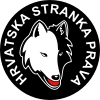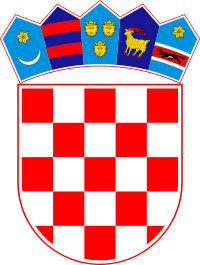Croatian Party of Rights
Croatian Party of Rights Hrvatska stranka prava | |
|---|---|
 | |
| President | Daniel Srb |
| Vice Presidents |
Pejo Trgovčević Ivica Zorica |
| Founder | |
| Preceded by | Party of Rights |
| Headquarters | Zagreb, Croatia |
| Youth wing | Youth Club of the Croatian Party of Rights |
| Military wing |
Croatian Defence Forces (HOS) (1991-1993) |
| Membership (2011) | 41,400 |
| Ideology | |
| Political position | Right-wing |
| National affiliation | Coalition "Move"[1] |
| Colors | Black |
| Slogan |
Bog i Hrvati (God and Croats) |
| Seats in the Sabor |
0 / 151 |
| Seats in European Parliament |
0 / 11 |
| County Prefect |
0 / 21 |
| Mayors |
1 / 128 |
| Election symbol | |
 | |
| Website | |
| http://hsp.hr/ | |
The Croatian Party of Rights (Croatian: Hrvatska stranka prava, HSP) is an extra-parliamentary Croatian nationalist[2] conservative right-wing political party in Croatia. The "right(s)" in the party's name refer to the legal and moral reasons that justify the independence and autonomy of Croatia.[3] While the HSP has retained its old name, today it is a right-wing party with an ethnocentric platform.
Founding
The HSP, along with other modern Croatian parties (such as Croatian Pure Party of Rights), claims legacy of the Party of Rights which was founded in 1861 and existed until 1929.
During the Croatian War of Independence (1991-1995)
A group of intellectuals restored Croatian Party of Rights on 25 February 1990.[4] Dobroslav Paraga, the first president of the party acknowledged the historical bounds with the older Party of Rights. Soon, the party faced splits.[4] Krešimir Pavelić, a former secretary of the party, became president of the new Croatian Democratic Party of Rights.[4] Some other rights parties that claimed origin from old Party of Rights appeared.[4] Croatian Party of Rights did not participate in the Croatian parliamentary election in 1990,[5] which helped Croatian Democratic Union (HDZ) to win more votes.[5]
HSP's political appeal and strength were at peak during the 1991-92 when Croatian Defence Forces, a military wing of the HSP, took heavy burden of defence of Croatia.[5] Paraga was the champion of the Croatian will for freedom and independence.[6] Tuđman was harshly and openly criticized by HSP and Paraga, especially because of cooperation with Serbia and tragic conflict with Bosniaks in Bosnia and Herzegovina.[6]
The ruling HDZ cooperated with the HSP until the fall of Vukovar, after which the leaders of the HSP and HOS were imprisoned for "terrorist activities" and "obstruction of democratically elected government". Paraga and the Croatian Party of Rights appeared in front of a military tribunal on allegations of insubordination.[4] They were later released. Paraga's main political and electoral platform was the creation of a Greater Croatia and the total defeat of the Serbian aggressor.[6] In the Croatian parliamentary election held in 1992, HDZ lost 7% of votes in favor of the Party of Rights.[5]
One of the party's first post-communist leaders, Ante Paradžik was a political dissident during the former Yugoslavia when he was a student leader of the Croatian Spring, but he was killed during the war by assassination. Paraga found himself in a power struggle with his deputy, Anto Đapić. Paraga and Đapić fought a legal battle for the right to use the party name, a dispute that Paraga eventually lost. Paraga later formed the Croatian Party of Rights 1861 (HSP 1861) but by this time he was already politically marginalized.
On 17 September 1993, the leaders of the three rights parties held a meeting in Kutina and began preparations for a new union on a broad common rights program.[4] The initiative for the meeting came from the new leaders of the HSP, Anto Đapić and Boris Kandare,[4] who invited leaders of the Croatian Pure Party of Rights and the Croatian National Democratic League but the meeting was unsuccessful, and those parties are still acting separately.[4] During the parliamentary election in 1995, HSP lost popularity due to bad situation in the party in favor of HDZ.[5]
Post Croatian War of Independence
The long-time president of modern HSP was Anto Đapić. His political reputation was severely tarnished after the media found out that he cheated to obtain his first post-graduate degree in law at the University of Split, in collusion with Boris Kandare, a senior member of his party and professor at the Law Faculty. He was also publicly accused of faking injuries to obtain the status of a war veteran. Despite these revelations, Đapić's career as head of the HSP was unaffected. Even after the party was left by many and it had terrible results (losing seven out of eight seats from 2003) on the Croatian elections in 2007, he remained as head of the party (he temporarily resigned, but in less than few weeks he has withdrawn his resignation).
At the Croatian parliamentary election, 2003, the party – in an alliance with Međimurje Party (Međimurska stranka), Zagorje Democratic Party (Zagorska demokratska stranka) and non-partisan Slaven Letica – won 6.4% of the popular vote and 8 out of 151 seats, all for the HSP and Slaven Letica.
In August 2005, the Croatian Democratic Republican Party (Croatian: Hrvatska demokratska republikanska stranka, HDRS), a right-wing political party established on 21 October 2000, by merger of three smaller right-wing parties,[7] merged into the Croatian Party of Rights.[8]
The first president of HDRS was Joško Kovač. In September 2007, prominent members Miroslav Rožić and Tonči Tadić left the party. In November at the Croatian parliamentary election, 2007, the party suffered a setback, as it won 3.5% of the popular vote and a single seat in Sabor. After the Croatian local elections, 2009, which weren't particularly successful for the party either, turmoil in the party leadership escalated when a faction led by former representatives Ruža Tomašić and Pero Kovačević formed a splinter "Croatian Party of Rights dr. Ante Starčević".
At the party convention held on 7 November 2009, Đapić officially stepped down, allowing a new leader to be elected by party members. Daniel Srb defeated two other candidates to become the new president of the party. Croatian Party of Rights announced that during the Croatian parliamentary election in 2011 holders of their list in VII Electoral District (primary Lika and Gorski Kotar) would be exclusively women.[9]
The party, for the first time, didn't win any parliamentary seats in the Croatian parliamentary election, 2011, which led to a crisis in Party of Rights; leaders of the Dalmatian branch of the party called for resignation of honorary president Anto Đapić.[10] The president of the HSP in Split, Hrvoje Tomašević, asked for Đapić's resignation from politics and election in the party.[10] He was supported by the president of the HSP in Dubrovnik, Denis Šešelj.[10] This appeal resulted in Đapić's resignation from party politics.[11]
On 28 January 2013, the Presidency of the Croatian Party of Rights expelled its former honorary president Đapić from the party. Srb, the party's president, said that Đapić expelled as he broke his promise that he wouldn't be active in politics. Đapić said that he was shocked by the decision.[12]
Election history
Legislative
The following is a summary of the party's results in legislative elections for the Croatian Parliament. The "Total votes" and "Percentage" columns include sums of votes won by pre-election coalitions HSP had been part of and the "Total seats" column includes sums of seats won by HSP in election constituencies plus representatives of ethnic minorities affiliated with HSP.
| Election | In coalition with | Votes won | Percentage | Seats won | Change | Government |
|---|---|---|---|---|---|---|
| (Coalition totals) | (HSP only) | |||||
| 1992 (August) | None | 186,000 | 7.06 | 5 / 138 |
|
Opposition |
| 1995 (October) | None | 121,095 | 5.01 | 4 / 127 |
|
Opposition |
| 2000 (January) | HKDU | 152,699 | 5,19 | 4 / 151 |
|
Opposition |
| 2003 (November) | ZDS–MS | 157,987 | 6.4 | 8 / 151 |
|
Opposition |
| 2007 (November) | None | 86,865 | 3.5 | 1 / 153 |
|
Opposition |
| 2011 (December) | HS | 72,360 | 3.0 | 0 / 151 |
|
Opposition |
| 2015 (November) | HKS–OS | 13,980 | 0.6 | 0 / 151 |
|
Opposition |
Presidential
The following is a list of presidential who ran as HSP members.
- 1992 – Dobroslav Paraga (finished fourth with 5.5% votes)
- 2000 – Anto Đapić (finished fifth with 1.8% votes)
- 2005 – Slaven Letica (finished fifth with 2.59% votes)
- 2014–15 (Dec–Jan) – Milan Kujundžić (finished fourth with 6.3% votes)
See also
- Croatian Party of Rights of Bosnia and Herzegovina, the sister party in Bosnia and Herzegovina
References
- ↑ http://www.dnevno.hr/vijesti/hrvatska/osniva-se-pomak-jos-jedna-pravaska-koalicija-saznajte-tko-ju-cini-940085
- ↑ Janusz Bugajski (1995). Ethnic Politics in Eastern Europe: A Guide to Nationality Policies, Organizations, and Parties. M.E. Sharpe. pp. 461–. ISBN 978-0-7656-1911-2.
- ↑ Stallaerts 2010, p. 72.
- 1 2 3 4 5 6 7 8 Stallaerts 2010, p. 73.
- 1 2 3 4 5 Ramet 1999, p. 177.
- 1 2 3 Ramet 1999, p. 178.
- ↑ "Stranački život" (in Croatian). Croatian Radiotelevision. 27 January 2001. Retrieved 25 May 2008.
- ↑ (Croatian)
- ↑ Romić, Tea (11 November 2011). "Pravašice: U nas nema muškaraca, našu listu nosi 14 pametnih žena". Večernji list. Retrieved 11 November 2011.
- 1 2 3 Jurković, Edi (10 December 2011). "I Šešelj protiv Srba na čelu HSP-a". Večernji list (in Croatian). Archived from the original on 7 January 2012. Retrieved 10 December 2011.
- ↑ "Anto Đapić povlači se iz političkog života svoje stranke". Večernji list (in Croatian). 12 December 2011. Retrieved 12 December 2011.
- ↑ "Anto Đapić izbačen iz HSP-a: 'Zaprepašten sam, moram skupiti dojmove'" (in Croatian). Dnevnik Nove TV. 28 January 2013. Retrieved 3 February 2013.
Bibliography
- Ramet, Sabrina P. (1999). The radical right in Central and Eastern Europe since 1989. The Pennsylvania University Press. ISBN 0-271-01810-0.
- Stallaerts, Robert (2010). Historical dictionary of Croatia. Scarecrow Press. ISBN 0-271-01810-0.
